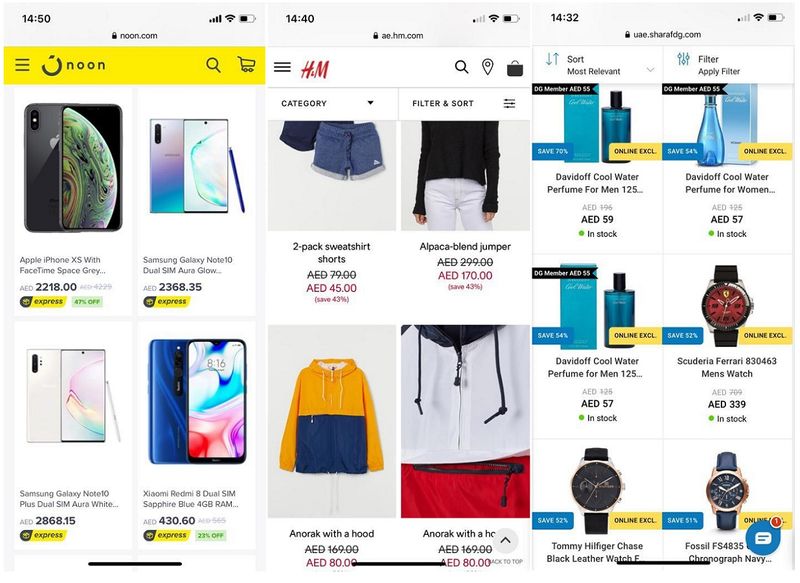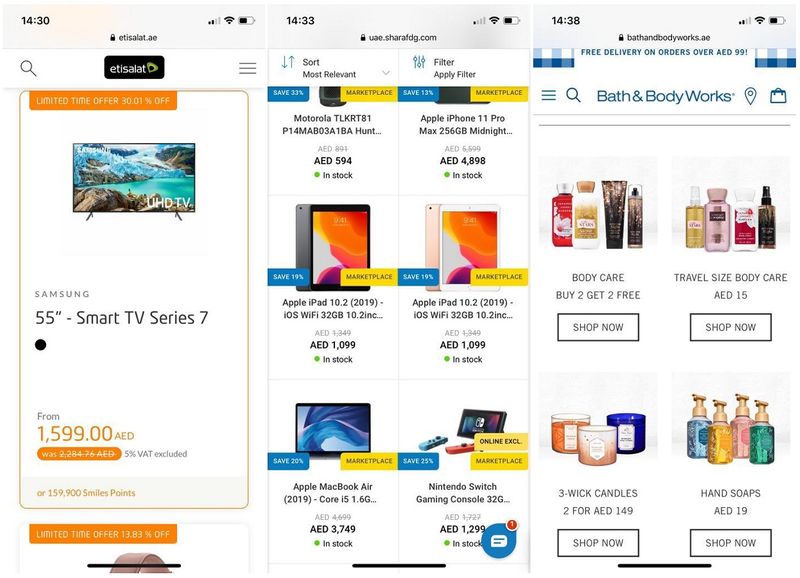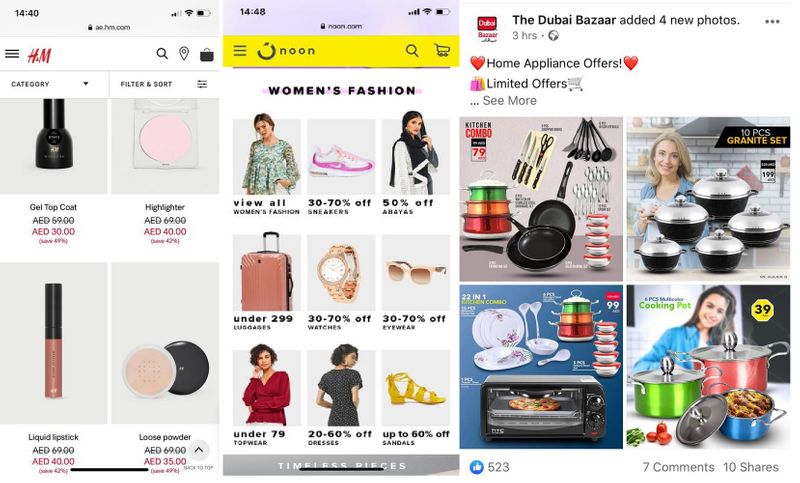
Dubai: Online shopping portals in the UAE are slashing prices left, right and centre to get consumers back into the spending other than on daily essentials.
Tech gadgets are feeling it — with iPhone XS’ advertised at a straight 47 per cent discount — and so are apparel and accessories, where too some of the latest deals are seeing cuts of between 30-45 per cent.
So the price drop for the iPhone Xs is from Dh4,406 to Dh 2,399 on noon.com, for example.
In-season items
And these are not just on fashion merchandise that are a season or two old, but those in-season as well.
If it’s fragrances the shopper is after, then the discounts go even deeper.

Expect more aggressive prices going forward if online retailers end up with far more unsold inventory than they had been planning to have at this time of the year.
Industry feedback suggests that very little buying has taken place on consumer goods since the second-half of February, which was when more instances of coronavirus cases started getting reported across the Gulf.
But discounts have been there even earlier.
“Prices on apparel and electronics experienced average declines of 10-15 per cent since the beginning of the year,” said Altaf Patel, Manager – Procurement at Dubai Bazaar, the portal that aims for the budget conscious shopper.
“It’s hard to ascertain whether this is attributed to inventory liquidation and/or concerns about fall in demand.
“But we are starting to see some shortages of products from China… predominantly in the unbranded category. It remains to be seen how long this will continue.”

Feeding online portals
Chinese suppliers remain the favoured source for UAE and Gulf shopping portals, and especially when it comes to apparel, accessories and a range of electronics and smartphone choices.
Then you have the cross-border portals, which make up about 30 per cent of the “gross merchandise value” of goods bought by online shoppers in the UAE and Gulf.
Of that 30 per cent, Chinese portals contribute nearly three-fourths of the goods, according to estimates by Redseer Consulting. (Gross Merchandise Value refers to the total value of goods sold over a given period of time – typically a year - through an online site.)
“These Chinese cross-border players will see a drop as a result of increased delivery times,” said Sandeep Ganediwalla, Partner at RedSeer. “We estimate this impact to be negative 5-10 per cent of total online GMV in the first-quarter of 2020.”
According to him, rather than outright price slashes, Chinese portals are offering discount vouchers to compensate for any shipping-enforced delays.
Out to calm shopper fears

One reason why local shoppers are reluctant to place orders relate to concerns about where the goods are shipped out from. They are giving Chinese-made suppliers a miss.
This is the fear the Chinese are trying to overcome. “It’s fair to say that most Chinese e-commerce retailers have experienced a slowdown in business shipping products to GCC countries,” said Molly Miao, founder and Chief Marketing Officer at Shein, a fast fashion e-commerce platform.
“There is unfortunately a lot of misinformation that circulates on social media, which can affect sales. So we try and educate people as much as possible; we have taken extra precautions in our warehouses.
“All of our staff are required to wear masks while handing packages and checked daily to make sure they are free of illnesses. Every package is wiped clean, sprayed with disinfectant and checked by six different departments before they leave the warehouse.”
Get shipments back on track
Meanwhile, logistics suppliers say that incoming shipments from China are inching back to normalcy.
“I don’t see the delay in logistics from China to the Middle East anymore,” said Rita Huang, founder of the last-mile delivery service provider iMile. “Passenger flights have been suspended, but cargo movements are still operating.
“The capacity may get a minor impact… but in terms of lead time (on delivery), everything is normal.”
According to Huang, customers here are being reassured that origin of the goods should not be a problem.
“The World Health Organisation has posted that the virus can only exist on a living body for two hours — so it’s safe to receive orders from China, which will — normally — take three to five days to reach the Middle East.”
What the doctor says
The possibility of catching a coronavirus infection from packages shipped from China sure is a concern for shoppers, according to Dr. Nameer Abdul Majeed, Specialist Dermatologist at Aster.

Hence the risk of the infection spreading from packages shipped over days or weeks is practically nil
“But the virus has poor survivability on surfaces... hence the risk of the infection spreading from packages shipped over days or weeks is practically nil. Yes, some viruses do survive longer than others. But conditions such as surrounding temperature, humidity, and surface material can influence longevity.
“Most viruses outside a living host becomes non-viable within hours in a natural environment. It’s not practical to spread the coronavirus as a contagion through shipments handled by an infected person or environment.”
Now, online shopping portals are hoping this message will spread far and wide and that it would convince shoppers. That and a little bit of discounts...








